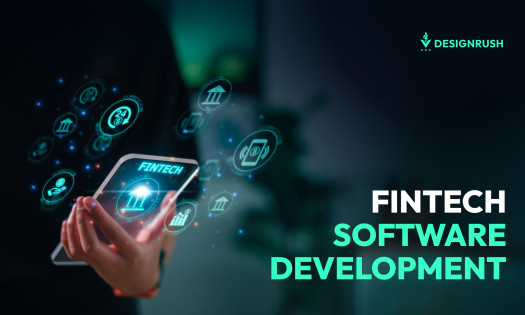The financial technology industry is undergoing a powerful transformation as a result of ongoing digital disruption and global innovation. Banks, neobanks, payment processors, and startups are now being pushed to rethink how software fits into the needs of the marketplace, as a result of the demand for simple, secure and personalized financial services. The next 3-5 years (2025-2030) will see next generation technology starting to be available, as well as regulatory compliance evolving through different levels of industry acceptance as organizations will undergo rapid development. Working with a leading edge Fintech Software Development Company will allow organizations to leverage and benefit from industry trends. Let’s take a look at the key forces of change that will be driving the future of Fintech Software Development, and how organizations can embrace change, to develop resilience, and know how to scale and adapt in an increasingly digital and customer validated world.
Key Trends of Fintech Software Development (2025–2030)
1. The Rise of Artificial Intelligence in Fintech
Artificial Intelligence (AI) is changing the entire fintech ecosystem, helping to deliver hyper-personalized customer experiences, sophisticated risk management, and fraud prevention. There will be massive investments by Financial Institutions into AI-led analytics, robo-advisors, intelligent chatbots, and algorithmic trading in efforts to create efficiencies and offer more personalized financial solutions.
Partnering with AI Development Services will become standard practice to build resilient, learning-based platforms for automating any process, including managing portfolios and credit scoring. Advanced Natural Language Processing (NLP) based applications will help manage more complicated inquiries from customers, while machine learning will perform real-time credit risk analysis and relevance of products.
2. Blockchain and the Tokenized Economy
Blockchain is no longer simply the basis for cryptocurrencies; it is the basis for the emerging tokenized economy. The secure, decentralized ledgers that act as alternative mediums of transactions and reinforce risks are completely changing how businesses and finance view transactions, asset transfers and contracts. Smart contracts will enable the settlement of complex transactions from 2025-2030. Digital assets will also be ubiquitous, and decentralized finance (DeFi) will become mainstream.
Fintech platforms will connect to blockchain infrastructure to underpin transparent settlements, emboldened cross-border transfers, KYC (Know Your Customer) shared compliance, and regulatory reporting compliance, building momentum toward more acceptance of digital identity and verifiable credentials.
3. Growth of Embedded Finance and Open Banking
Transactions conducted by an individual will be undetectable, as embedded finance – delivering financial services through other non-financial platforms – matures. E-commerce, travel, logistics, and other businesses will offer embedded payments, lending, and insurance as a result of Open Banking – whereby secure APIs enable users to access and share financial information across multiple providers in real time.
To enable these new practices, institutions will rely on Bespoke Software Development Services for ensuring secure integrations and compliant data sharing. The overall fintech back end stack will evolve to be more modular, interoperable, and scalable to deliver composable journeys for each segment of customers.
4. Cloud-Native and Composable Architectures
There will be a rise in reliance on cloud-native, micro-services based, composable architectures, as they provide the scalability, speed, speed, and cost effectiveness required for rapid iteration of products and regulatory obligations. Banks and lenders will replace expensive, monolithic, legacy software solutions with less expensive, cloud-based infrastructure that is containerized (to Kubernetes), has serverless and API-coded capabilities, and can plug and play with existing software and systems.
This assures reliability, no downtime on deployment, and a scalable architecture to continuously integrate the best of what the industry can demonstrate, without tech debt.
5. The Evolution of Digital Payments
Innovation in the digital payment space keeps driving fintech. In the next five years, we will see even wider adoption of contactless, biometric-verified, and tokenized payment methods. Central Bank Digital Currency (CBDCs) and increased acceptance of digital wallets, Peer-to-Peer (P2P) transfers, and cross-border interoperable QR code schemes will make payment more secure and equitable to regions across the globe.
The conventional use of biometric verification, fingerprint, iris, and facial recognition, will become the standard for fraud prevention. Real-time settlements and cross-border remittances will be frictionless using instant clearing platforms and blockchain-based rails. Payment orchestration will create even more resilience and smart routing among processors.
6. Heightened Focus on Security and Compliance
With the rise in cyber threats and changing regulatory regimes, the importance of security and compliance with data has never been higher in any situation where financial services are being provided. To that end, next-generation fintech software needs to embed security by design, with multiple layers of security that use advanced encryption protocols, zero-trust architectures, and continuous monitoring.
Currently emerging, privacy-enhancing technologies (PETs), including homomorphic encryption and confidential computing, will secure highly sensitive financial data. Machine learning and AI will facilitate automation of anti-money laundering (AML) and suspicious activity monitoring on front-end user interface and back-end systems. New RegTech innovations will allow for real time reporting to help organizations comply with global recommendations to meet standards for PSD2, GDPR, and Open Banking obligations.
7. Personalized and Inclusive Financial Experiences
AI and analytics will standardize hyper-personalized products and services in the sector. Using the data collected, fintechs will develop products designed for underserved markets, including the unbanked, micro-entrepreneurs, freelancers, and gig workers, increasing access to financial services.
Fintech companies will utilize more advanced analytics, behavioral biometrics, and sentiment analysis to offer personalized onboarding, loan approvals, portfolio recommendations, and customer touch points. Better accessibility features and responsive UX/UI designs will improve the customer experience for differently-abled people as well as people who may be new to the digital economy.
8. Sustainable Finance and Green Fintech
Sustainability will become a central tenet of finance in the future. Fintech platforms will directly incorporate ESG (Environmental, Social, Governance) metrics to provide transparency on carbon patterns, ethical investments, and green lending to consumers and investors.
Carbon tracking, green digital wallets, impact investing, and blockchain-based carbon credits will enable both consumers and institutions to work toward sustainability goals. Reporting technologies will facilitate climate risk assessments and stay ahead of a growing landscape of green finance compliance reporting requirements.
9. Low-Code and No-Code Development in Fintech
In reaction to the growing demand and limited available talent, fintech firms will lean toward low-code or no-code platforms for rapid prototyping, automated regulatory reports and client onboarding. Additionally, business users will be enabled to automate processes, develop MVPs, and iterate on applications for clients with little or no code.
The combination of low-code or no-code and API-first will accelerate development speeds, enabling software development companies to concentrate on more highly valuable areas such as integrations, AI and core platform logic.
10. The Role of Quantum Computing and Future-Ready Infrastructure
Quantum computing is still in its early stages, yet it already offers the potential for computing powers that are exponentially efficient. With fintech, that means real time risk analysis, and higher levels of modeling, to potentially breaking ground in cryptography and even new forms of security protocols.
Visionary fintech software development companies will use quantum algorithms, use of blockchain and security encryption that is quantum-safe. It is prudent for fintech companies to invest in flexible, future-ready architecture, as quantum computing may accelerate the pace of change.
Conclusion
Fintech is well-positioned for a rich and broad transformation through 2030. For organizations that want to compete for their rightful place in this new age of finance, they must also continuously innovate, have a customer focus and bring a level of technology agility and flexibility. Working with an AI Development Services company will surely yield secure, scalable, future-proof solutions. Engaging strong development services will structure fintech players’ to build cloud-native, modular, compliant platforms in reactive environments. By anticipating these changes, and by investing in the right talent and partnerships, fintech leaders will provide experiences that are socially inclusive, sustainable, resilient and digitally advanced to the future.












